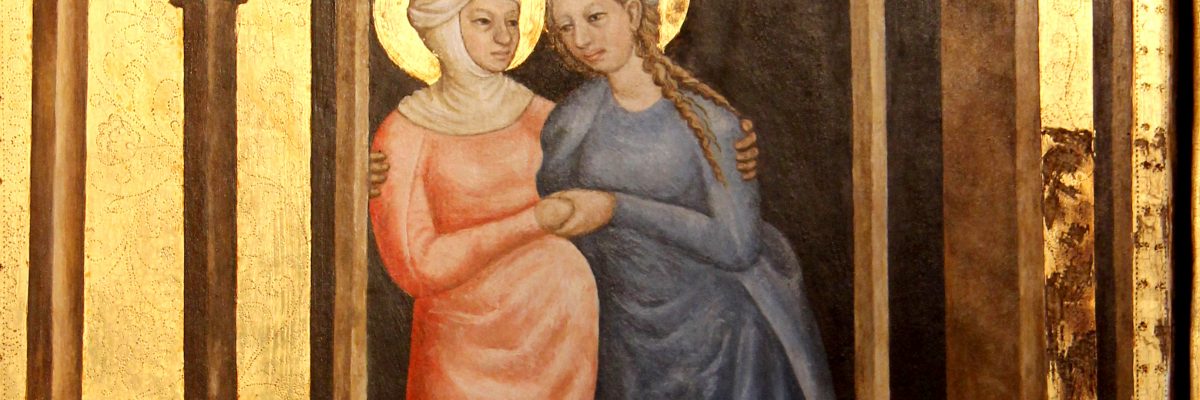
Homily for the Fourth Sunday of Advent, Year C
And how does this happen to me,
that the mother of my Lord should come to me?— Luke 1:43
Who is the King of Glory?
Who is this that is come from Edom, with red garments from Bosor? thus fair in his apparel, with mighty strength?
Who is like God?
Who is this that cometh forth like the morning rising fair as the moon, bright as the sun terrible as an army set in battle array?
These are just a few questions from the Old Testament, asked—according to tradition—by the angels, from Isaiah, from the Psalms, from the book of Daniel, from the Song of Songs.
When a mighty spirit asks a question it is certain that we are in the presence of a mystery. Angels know the answers to most questions. Their knowledge of nature is certain and unerring. They simply perceive, contemplate and adore the designs of divine love.
In human nature the tendency not to ask questions is usually a mark of humility of heart, of acceptance of things as they are, of a peaceful embrace of whatever God sends. This is similar to the angels’ penetrating knowledge, but it is more rooted in simple love, not in perfect understanding: like the compliance of a trusting child.
So when a very holy person, on being presented with God’s action and designs, asks a question, we can be sure that she does so, not to resist the divine will or to hesitate in its accomplishment, but really and honestly because she wants to do God’s will but cannot understand it, and fears to make an error.
In these days preceding our celebration of the mystery of Mary’s birthgiving of the Son of the Eternal Father, we have seen the example of Zachary, in which he questions the angel, but not with a humble spirit, and so the Lord punishes him. But when Our Lady asks an almost verbally identical question on receiving her revelation from the same angel Gabriel, she is answered mildly and encouragingly, because her question is asked not doubtingly, but humbly. (This, parenthetically, should teach us that two almost identical behaviors can have very different interior motivations; thus we are told, “Judge not!”)
So today we are confronted by the lovely humility of the mother of the Baptist. She had already conceived miraculously since she was barren from her youth, and her husband had receive a message directly from God as he worshiped in the temple fulfilling his official, priestly role. So perhaps if she had been a modern Catholic woman, accustomed to the enthusiasm of so many private revelations, she might have said, “I have been expecting you!”
But she didn’t. Rather, she did not presume on the power of God and assume that she was permanently privileged going from one revelation to another!
The doctors of the mystical life tell us that authentic revelations fill their recipients with a holy fear, and so they are never taken for granted, but are always a source of wonder and amazement. Our holy religion is founded on revelations given by the Holy Trinity, revelations that exceed human understanding and always fill us with wonder.
Imagine this: Mary’s being Christ’s mother meant he was the one Son, by one sonship, both of the Eternal Father and of a woman born in time. We are not sons and daughters of our parents by different titles. You are not the son of your father by one filiation and the son of your mother by another filiation; you are identically the son or daughter of both your father and mother by an identical sonship.
So too with Christ. He is son of God and son of Mary by the same title of his sonship, one in time the other in eternity; but the one, unique Son of the Father and of Mary. This is mystery utterly beyond human or angelic understanding. All we can say is the question the Queen of the Angels asks: “How can this have come to be?”
“And how is it that the Mother of my Lord should come to me?”
Let us imitate the humility and wonder of the Holy Virgin and marvel at the great mystery of the Savior’s divine sonship of his natural Father from all ages and his natural mother in the flesh. And then let us gratefully marvel even still more at the fact that he has made us sons and daughters in himself, so that our lives are now a mystery as well, “hidden” as St. Paul says, “with Christ in God.”



